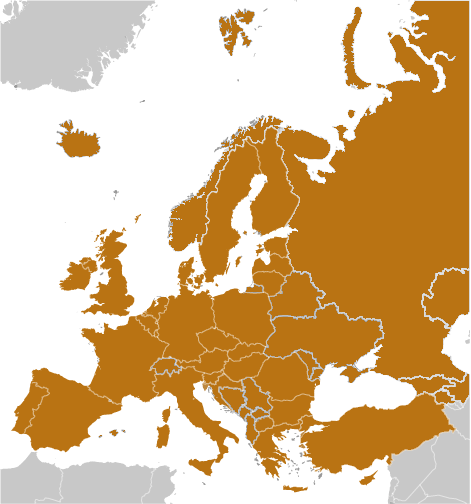Europe
Translate page into: español, Deutsch, français, Bahasa Indonesia, Kiswahili, 한국어, Nederlands, 日本語, 中文, português
| Europe | |
|---|---|
 Europe: Wikimedia Commons, 2009 | |
|
Countries with Anabaptist-Related Groups Formally Associated with MWC (2009) |
|
Europe is the birthplace of the Anabaptist movement. The Anabaptist church arose within the context of the Reformation in Europe. Huldrych Zwingli sowed the seeds of the Anabaptist movement in Zurich, Switzerland when he became the pastor of the Grossmünster in Zurich in 1519 and brought the Reformation movement to the town. He conducted Bible studies for individuals who could read both the Old and the New Testament in their original languages, and at these Bible studies were key individuals, like Conrad Grebel, Felix Mantz, and Adreas Catelberger who would go onto start the Anabaptist movement in Zurich. Soon after Zwingli had begun to reform the Church in Zurich, tension arose within his group about the extent of his reform efforts. Zwingli was hesitant to push for changes in the church without the approval of the conservative city council, while some of his students, like Grebel and Mantz wanted to push complete reform according to the biblical text that would include, among other things, voluntary membership through adult baptism. After public disputations between Zwingli and his more radical students in March and October of 1523, Grebel and his friends decided split from the existing church and begin their own movement. On January 21, 1525 in Felix Manz's house the Grebel and his circle conducted the first adult baptism.[1]
The fledgling movement experienced intense persecution from government authorities and many of the early leaders of the movement were martyred. Within this context early Anabaptist leaders met in Schleitheim, Switzerland to unify themselves with a confession. The resulting Schleitheim Confession affirmed a "Free Church" free from governmental influence that would remain separate from the world and live according to a biblical ethic that denounced, among other things, violence and the oath. These Swiss Brethren continued to grow despite intense persecution.[2]
In the Netherlands, the Anabaptist movement began in the 1530s. After a disastrous apocalyptic Anabaptist experiment in Münster, the Mennonite Church began when a former Catholic priest, Menno Simons, was re-baptized in 1537 and guided the Anabaptist movement in the Netherlands until his death in 1561. Eventually, in 1579 the Union of Utrecht guaranteed free religious expression, and Mennonites began to enjoy a more prominent role in public life. They soon became well known professionals and artisans. By the seventeenth and eighteenth centuries they were prominent business people at the top of their industries.[3]
Another Anabaptist group that began in sixteenth century Europe was the Hutterites. In 1529, Jacob Hutter, an Anabaptist from South Tyrol, fled to Moravia. There he encountered Anabaptists who shared community goods. Hutter was impressed by the group and joined a campaign to persuade fellow Anabaptists to emigrate from Switzerland to Moravia. The Hutterites thrived from 1560-1590 in Moravia, and today (2009) their communities exist around the world.[4]
The Anabaptist movement that began in Europe spawned many different Anabaptist groups that spread throughout Europe and eventually to Russia, North America, and the rest of the world. Despite the Anabaptist movement's birth in Europe, however, the Anabaptist church in Europe has slowly declined in recent years. In 2000 there were only 57,921 members of Anabaptist-related churches in Europe, and by 2006 that number had fallen to 52,222.[5] By 2009, however, that number had rebounded to 64,740.[6]
Countries with Anabaptist-Related Groups
In 2009 there were 16 countries in Europe with Anabaptist-related groups officially associated with Mennonite World Conference.
Other Regions
Click on the links below to learn about Anabaptist-related groups in other parts of the world:
- Africa
- Asia and Pacific
- Caribbean, Central and South America
- North America (United States and Canada)
Electronic Resources
- 2009 Mennonite and Brethren in Christ World Membership
- 2009 Mennonite World Conference Directory for Europe
- 2006 Mennonite and Brethren in Christ World Membership
Annotated Bibliography
- Lapp, John A. and Snyder, C. Arnold. Testing Faith and Tradition. Intercourse, PA: Good Books, 2006.
- Testing Faith and Tradition, edited by John A. Lapp and C. Arnold Snyder, is part of Mennonite World Conference's Global Mennonite History Project. The book is a compilation of essays that discuss the history of several Anabaptist-related groups in Europe from 1850 to the present. The book contains articles on Mennonites in the Netherlands, Germany, Switzerland, France, Russia, as well as chapters on Anabaptist-Mennonite history in Europe from 1525-1800 and mission efforts in Europe.
Archives and Libraries
- The MHL is a research level library located on Goshen College's campus in Goshen, Indiana that collects bibliographies, texts and images on topics related to the Radical Reformation, the Anabaptists, Hutterites, Mennonites, Amish and various related groups. The MHL has many resources on Mennonite groups in the Caribbean, Central and South America. To contact the MHL email mhl@goshen.edu or call (574) 535-7418.
- There are many archives and libraries throughout Europe relating to specific countries or Anabaptist related groups. To learn more about these archives and libraries click on the country links above.
External Links
Global Anabaptist Mennonite Encyclopedia
Citations
- ↑ Diether Götz Lichdi, "An Overview of Anabaptist-Mennonite History, 1525-1800," in Testing Faith and Tradition, ed. John A. Lapp and C. Arnold Snyder (Intercourse, PA: Good Books, 2006), 6-10.
- ↑ Ibid., 11-12.
- ↑ Ibid., 12-16, 25.
- ↑ Ibid., 17.
- ↑ "2006 Mennonite and Brethren in Christ World Membership," Mennonite World Conference, http://www.mwc-cmm.org/en15/index.php?option=com_content&view=article&id=13&Itemid=16 (accessed 6 July 2009).
- ↑ "2009 Mennonite and Brethren in Christ World Membership," Mennonite World Conference, http://www.mwc-cmm.org/en15/index.php?option=com_content&view=article&id=13&Itemid=16 (accessed 20 February 2010).
- ↑ While the Association Mennonite Luxembourgeoise was listed in the 2006 Mennonite World Conference directory, no Anabatist-related groups from Luxembourg were listed in the 2009 Mennonite World Conference directory.